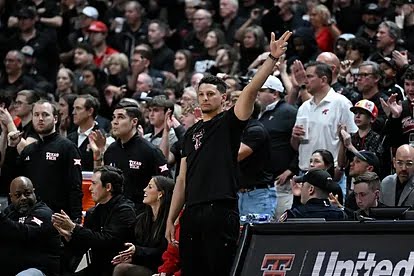NFL
Is Patrick Mahomes’s Alma Mater Taking Advantage of Him to Help Fund Their Football Facility? The Story Behind the Project

Is Patrick Mahomes’s Alma Mater Taking Advantage of Him to Help Fund Their Football Facility? The Story Behind the Project
A recent controversy has emerged over a bold fundraising initiative at Patrick Mahomes’s alma mater, Texas Tech University. As the institution embarks on a project to upgrade its football facility, some critics are questioning whether the university is leveraging Mahomes’s star power to boost donations—and if so, whether this practice crosses an ethical line.
The Fundraising Initiative
Texas Tech University, known for its proud athletic tradition, recently announced an ambitious plan to renovate and expand its football facility. According to university officials, the project is designed to enhance the game-day experience for fans and provide student-athletes with state-of-the-art training resources. Central to the campaign is the use of imagery and narratives that highlight the achievements of famous former players, most notably Patrick Mahomes, whose meteoric rise in the NFL has brought national attention to his college roots.
Mahomes’s Connection to Texas Tech
Patrick Mahomes, one of the NFL’s brightest stars, played his college football at Texas Tech before ascending to stardom with the Kansas City Chiefs. While his time at the university was relatively brief compared to other collegiate legends, his subsequent success has made him a poster child for what Texas Tech athletes can achieve. The fundraising campaign prominently features Mahomes’s legacy, with promotional materials drawing on his success to inspire alumni and fans to contribute.
Allegations of Exploitation
Critics argue that by prominently featuring Mahomes in its fundraising efforts, Texas Tech may be taking advantage of his popularity without his direct endorsement or involvement. Detractors contend that while universities routinely celebrate the accomplishments of their alumni, this campaign appears to lean heavily on Mahomes’s image to attract donations—raising questions about consent and fair representation. Some have asked whether Mahomes was consulted about the use of his likeness and whether he stands to benefit in any way from the project’s financial success.
A vocal segment of the alumni community has expressed concern that the university’s strategy borders on opportunism. “It feels like they’re cashing in on his success without his input,” one former student commented. “There’s a fine line between celebration and exploitation, and many of us wonder where it falls in this case.”
University’s Defense and Broader Context
In response to the mounting criticism, a Texas Tech spokesperson stressed that the fundraising campaign is rooted in a long-standing tradition of honoring successful alumni. “We are proud of all our former students and the paths they have taken,” the spokesperson noted. “Highlighting Patrick Mahomes is part of a broader effort to inspire current and future generations. Our goal is to build a facility that reflects the spirit and ambition of our entire athletic community.”
This practice isn’t unique to Texas Tech. Many universities leverage the achievements of their notable alumni to create compelling narratives for fundraising. Supporters argue that such associations not only boost donations but also foster a sense of pride and unity among students, alumni, and fans. They contend that when high-profile figures like Mahomes succeed, it reflects well on the institution as a whole—even if the individual was only part of a larger story.
As the controversy unfolds, several questions remain unanswered. Has Patrick Mahomes’s camp made any public statement regarding the campaign? Will there be a financial arrangement or a formal endorsement that clarifies his role in the project? For now, both the university and its critics seem to be waiting for further clarification.
The debate raises important questions about the ethics of fundraising in collegiate sports and the responsibilities of educational institutions when using alumni success stories to drive financial support. As Texas Tech moves forward with its plans, it will likely serve as a case study in the delicate balance between celebration and exploitation in the world of college athletics.
The story behind Texas Tech’s football facility project and its use of Patrick Mahomes’s legacy is emblematic of a broader trend in collegiate fundraising. While leveraging the success of notable alumni can be a powerful motivator for donors, it also invites scrutiny about consent, fairness, and the true beneficiary of the publicity. As both sides of the debate await further developments, one thing is clear: the intersection of sports, money, and legacy continues to be a contentious—and captivating—topic in modern collegiate athletics.










